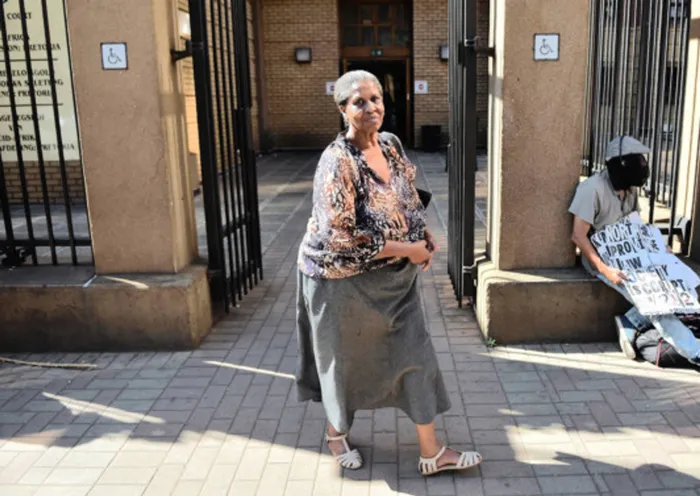
Mary Rahube earlier leaving the high court in Pretoria. She won the legal battle for women to be able to own their family homes after apartheid laws had forbidden this. She will now return to court to have her family home registered in her name.
Image: Picture: Oupa Mokoena
A Mabopane, north of Pretoria granny hailed as a hero to many women as she is the first black woman to pave the way for others who were in the past denied the right to own land to now rightfully claim what is theirs, will now ask the court to officially register her family home in her name.
In recognising the rights of all women to own land, the Constitutional Court in 2018 spoke the final word and declared that a piece of legislation created by the racist and sexist apartheid era could not pass constitutional muster.
In an unanimous judgment at the time, the apex court declared a section of the Upgrading of Land Tenure Rights Act unconstitutional, due to Mary Rahube and Louise du Plessis of Lawyers for Human Rights, who had been at her side from the onset.
Rahube initially approached the Gauteng High Court, Pretoria, which in a first step, paved the way for this elderly woman, who is in her 70s, to in future apply for the house she had called home for more than 40 years, to be hers.
Rahube never owned her family house in Mabopane, as apartheid legislation prohibited black women from owning land. But, after the court declared a section of the act unconstitutional, Rahube will soon embark on her last legal journey - this time to ask the Gauteng High Court, Pretoria, to register her family home in her own name.
As things stand, the family home is registered in the name of her brother, Hendsrine Rahube, as in terms of the apartheid law, she was not allowed to own it as a female. Her brother is, however, set on opposing this final battle.
“This will be the first application in this regard after she won the Concourt case and the subsequent amendments made by Parliament to the law,” Du Plessis said. She affirmed that in terms of the amendments to the act, women who ought to get houses still needed to go to court to ask for an order to that effect.
Rahube, her brother and other siblings have lived in the Mabopane property since the 1970s following their forced eviction from Lady Selbourne. Their grandmother “owned” the property, but not in the legal sense, as the family was by law precluded from doing so as she was a woman.
When she died, the children remained living there. The brother was in 1987 nominated by the family to be the holder of a certificate of occupation regarding the property. The following year, he was issued a deed of grant regarding the property.
Some years later, he turned to court to have his family evicted from “his home”. This was the start of Mary’s long and drawn-out battle to have the apartheid era legislation overturned and declared unconstitutional.
In the high court judgment, Judge Patricia Goliath earlier said African women under apartheid were systemically disenfranchised in a number of ways. The pervasive effects of patriarchy meant that women were often excluded from seemingly gender-neutral spaces.
She said under apartheid, the effects of patriarchy were compounded by legislation that codified the position of African women as subservient to their husbands and male relatives. This will be the first application in this regard after she won the Concourt case and the subsequent amendments made by Parliament to the law.
In her plight to have the house registered in her name, Rahube said due to the pervasive effects of patriarchy and the apartheid system and laws which compounded this, she was all these years excluded from owning the only place she has known as home. She said it is precisely because of this history that she should now be afforded the title deeds to the house.
